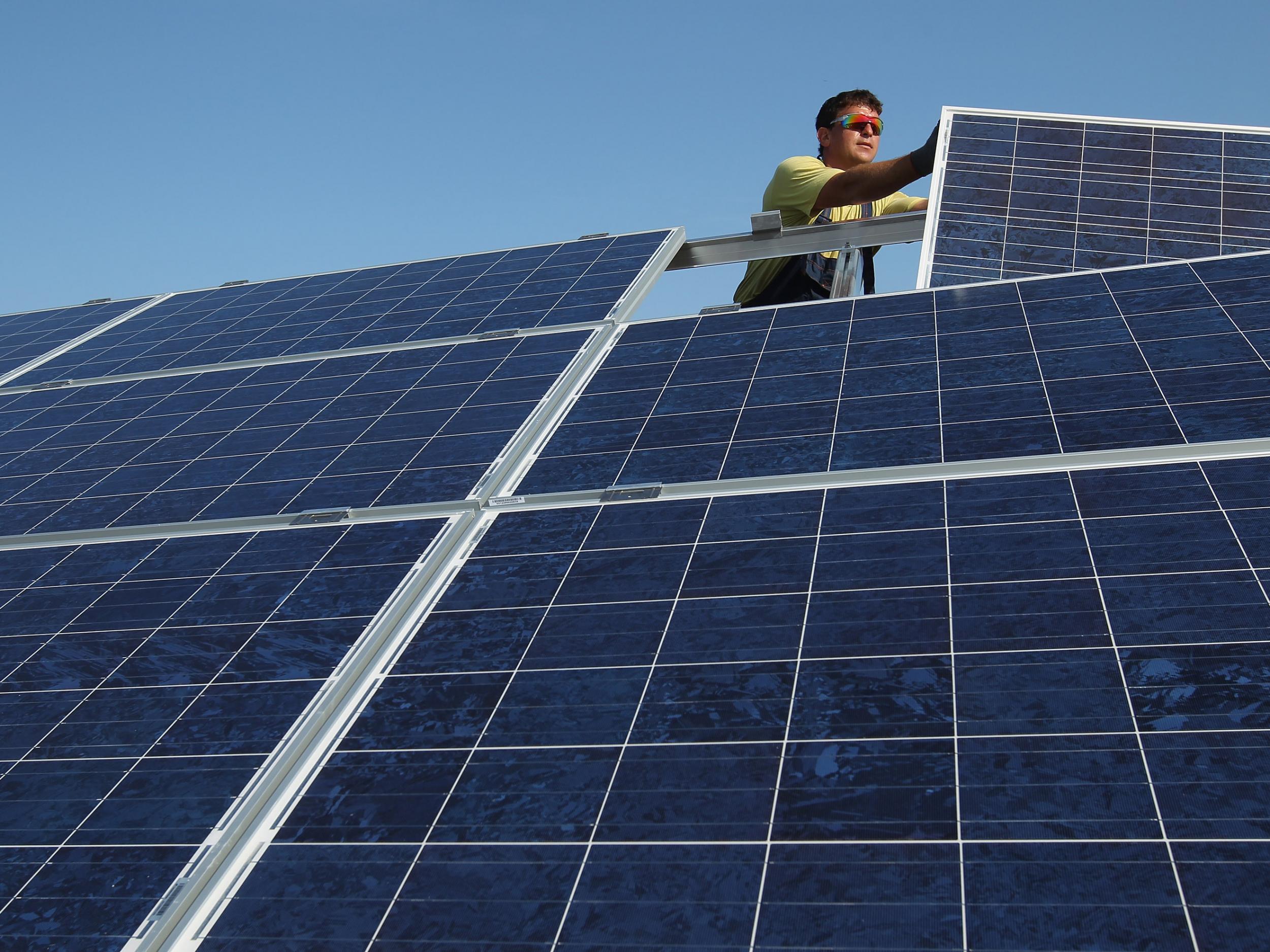Renewable energy set to be cheaper than fossil fuels by 2020, according to new report
‘Turning to renewables for new power generation is not simply an environmentally conscious decision, it is now – overwhelmingly – a smart economic one’

Your support helps us to tell the story
From reproductive rights to climate change to Big Tech, The Independent is on the ground when the story is developing. Whether it's investigating the financials of Elon Musk's pro-Trump PAC or producing our latest documentary, 'The A Word', which shines a light on the American women fighting for reproductive rights, we know how important it is to parse out the facts from the messaging.
At such a critical moment in US history, we need reporters on the ground. Your donation allows us to keep sending journalists to speak to both sides of the story.
The Independent is trusted by Americans across the entire political spectrum. And unlike many other quality news outlets, we choose not to lock Americans out of our reporting and analysis with paywalls. We believe quality journalism should be available to everyone, paid for by those who can afford it.
Your support makes all the difference.Renewable energy will be cheaper than fossil fuels in two years, according to a new report.
Experts predict that investment in green infrastructure projects will lead to decreases in the cost of energy for consumers.
Continuous technological improvements have led to a rapid fall in the cost of renewable energy in recent years, meaning some forms can already comfortably compete with fossil fuels.
The report suggests this trend will continue, and that by 2020 “all the renewable power generation technologies that are now in commercial use are expected to fall within the fossil fuel-fired cost range”.
Of those technologies, most will either be at the lower end of the cost range or actually undercutting fossil fuels.
“This new dynamic signals a significant shift in the energy paradigm,” said Adnan Amin, director-general of the International Renewable Energy Agency (IREA), which published the report.
“Turning to renewables for new power generation is not simply an environmentally conscious decision, it is now – overwhelmingly – a smart economic one.”
The report looked specifically at the relative cost of new energy projects being commissioned.
As renewable energy becomes cheaper, consumers will benefit from investment in green infrastructure.
“If the stuff you’re building to generate electricity costs less, the end effect of that is having to pay less for the electricity that comes from it,” Jonathan Marshall, energy analyst at the Energy and Climate Intelligence Unit (ECIU) told The Independent.
“The cheaper you install it, the better it is for everyone.”
The current cost for fossil fuel power generation ranges from around 4p to 12p per kilowatt hour across G20 countries.
By 2020, IREA predicted renewables will cost between 2p and 7p, with the best onshore wind and solar photovoltaic projects expected to deliver electricity by 2p or less next year.
Other methods of producing renewable energy, such as offshore wind farms and solar thermal energy, are not yet as competitive as fossil fuels.
However, the results of recent renewable power auctions for projects to be commissioned in the coming years suggest these forms too are due to drop in price.
Auctions provide a useful means of predicting the future cost of electricity.
“These cost declines across technologies are unprecedented and representative of the degree to which renewable energy is disrupting the global energy system,” said Mr Amin.
The new report comes after 2017 was declared the UK’s “greenest year ever” by WWF, when data from the National Grid revealed 13 different renewable energy records had been broken.
However, current UK policy may hamper the development of renewable energy capacity.
“Under current policy, the UK is at risk of being left behind as other countries take full advantage of the relentless fall in the cost of renewable energy,” said Mr Marshall.
Notably, the subsidy ban for new onshore wind farms has been singled out, with the ECIU predicting it could add £1bn onto energy bills over five years.
“If the Government is serious about achieving the lowest cost electricity in Europe, the ban on onshore wind has to be first in the firing line,” said Mr Marshall.
“Until this happens – and all low-carbon electricity sources are allowed to compete on equal footing – the gap between the cost of electricity in the UK and elsewhere will prevail; to the ire of politicians, businesses and household bill payers.”
A spokesperson from the Department for Business, Energy and Industrial Strategy said the Government could still support onshore wind where there is local support, such as on the Scottish islands.
“We are pleased to see that established technologies, such as onshore wind and solar, are driving costs down for consumers,” they said.
“If this continues, and they have local support, they may play a significant role in the energy mix in future.
“Since 2010, the UK has invested more than £52bn in renewable energy and in October, we confirmed that up to £557m would be made available for future clean power auctions.”
Join our commenting forum
Join thought-provoking conversations, follow other Independent readers and see their replies
Comments